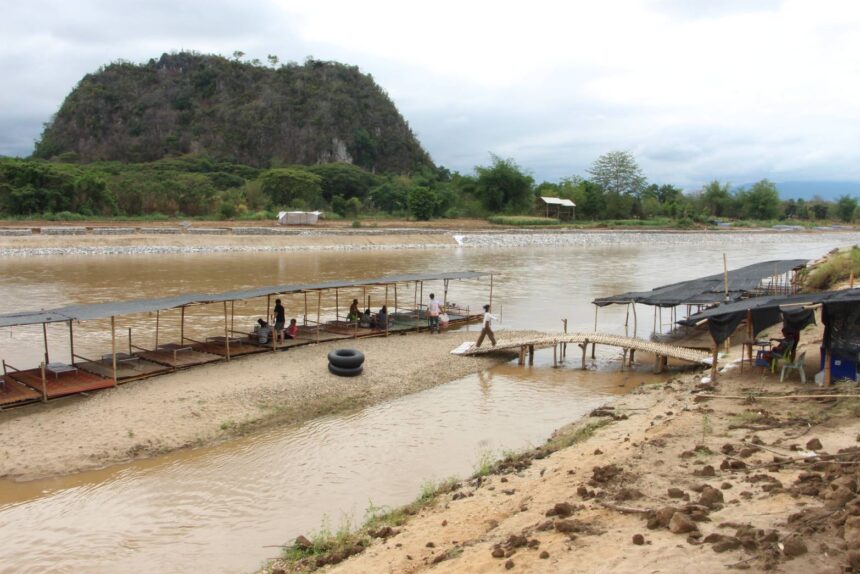Chiang Rai – Riverside shop owners along the Kok River are struggling to stay open as customers disappear following reports of arsenic contamination. The Chiang Rai governor says if water tests keep showing contamination above safe limits, restrictions on using the Kok river water will stay in place.
On Tuesday, CTN News reporters followed up on the ongoing issue of high levels of arsenic and other heavy metals detected in the Kok River. Contaminated areas stretch from Mae Ai District, Chiang Mai, all the way to Mueang Chiang Rai.
Local authorities have warned people not to touch or use river water for drinking or daily use. These warnings have hit tourism and riverside businesses hard. Restaurants and shops that once thrived during Songkran, when tourists flocked to play in the river and support local vendors, now face empty tables and falling sales. Some owners are dismantling their businesses and leaving the riverside.
Normally, at Nong Dan Bridge in Ban Pa Or, Mae Yao, Mueang Chiang Rai, floating raft restaurants would be full of visitors, especially during Songkran. In previous years, owners made 30,000 to 40,000 baht a day. This year, after the arsenic news broke, the area is quiet.
Many shops have no customers and some have already closed, hoping to find other ways to make a living.

Suchanart Pho Thong, 51, owner of Krua Je Porn 131, has sold food under the Nong Dan Bridge for over 32 years. Every Songkran, she used to earn 30,000–40,000 baht daily. But after the arsenic warning, her customers vanished.
Before the news, she could still make about 3,000 baht a day. Once the test results were public, earnings dropped sharply, sometimes to just 400 baht a day.
Even on Songkran, sales didn’t reach 2,000 baht. She feels stuck — unable to close because she’s already stocked up for the festival, but unsure how long she can hang on. She hopes a few customers might stop by, just enough to recover some costs. If things don’t improve, she’ll have to shut down and return to running a small restaurant in her village.
She and other local sellers have met to talk about their next steps but haven’t found any solutions. They’ve already filed a complaint with the Chiang Rai Damrongtham Centre, but officials there said they don’t know how to help. For now, several vendors are packing up their stalls.

Suchanart says she might last a little longer because she’s already invested. She bought perishable goods and has drinks on credit, so she needs to keep selling, even if she only earns 1,000–2,000 baht a day, just to get some money back.
Chiang Rai Governor Charin Thongsuk addressed public concerns, explaining that the regional environment office has collected water samples from Mae Ai, Chiang Mai, down to Chiang Rai. Results show that Mae Ai has high levels of arsenic and other heavy metals, well over the limits.
Chiang Rai’s levels are slightly above standard. Because of this, local agencies have notified people, warning them not to touch or use river water, and to avoid activities connected to the Kok River for now.
Drinking water quality has also been tested. Provincial Waterworks Authority confirms that tap water made with treated river water meets safety standards. The same applies to municipal, subdistrict, and village water systems.
Public health officials have sent teams to check tap water at various points, and all samples have met the required safety levels after treatment.

Moving forward, the environment office will keep testing the Kok River and Sai River weekly to track water quality trends and spot any problem areas. The Pollution Control Department is also helping to find the source of the arsenic contamination, especially outside Chiang Rai, where local agencies can’t investigate directly.
Governor Charin also mentioned that Chiang Rai’s fisheries department has checked fish in the river, and so far, the results are normal. To monitor public health, local health clinics along the Kok River are taking reports from anyone feeling unwell after using river water. This covers skin rashes, allergies, or other health worries that could be related to arsenic. Anyone with symptoms can report to their nearest clinic for a checkup.
As for riverside vendors affected by the contamination, the governor said that as long as arsenic levels remain above the standard, warnings and restrictions will stay in place to keep everyone safe. When tests confirm the water is safe again, the public will be notified right away.
Related News:
Expert Warns Chiang Rai Severely Lacks Flood Prevention Plans

Geoff Thomas is an award winning journalist known for his sharp insights and no-nonsense reporting style. Over the years he has worked for Reuters and the Canadian Press covering everything from political scandals to human interest stories. He brings a clear and direct approach to his work.












